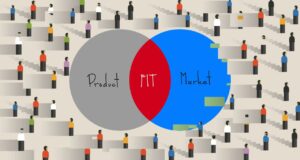Worried about the machines coming for your job? Embrace these characteristics and you’ll be fine—for now
The end is nigh. Throughout centuries of science fiction, we’ve consistently been reminded that the machines are coming for our jobs. And this time, they just may be right.
The last six months has, in many ways, felt like a sobering time machine adventure, seeing the rise of technologies that we perhaps thought decades away but are now very much in the palms of our hands. Artificial intelligence can write better than (most of) us, it can design faster than us, it even knows ourselves better than we do.
All this has thrown the job market into disarray. The glass-half-empty crowd will no doubt decry the AI apocalypse, despair at any prospect of competing with a machine, curl up into the corner until someone regulates the hell out of it. But the optimists will see this as a mighty opportunity, a chance to revolutionise their job profile and step towards careers that may previously have been too risky or too out of reach.
For the latter camp, here are the personality types and characteristics that we believe will help set you apart in the job market in 2023:
Ambitious generalists
AI has transformed the makeup of early startup teams. Where once it was believed you needed teams of hundreds of people to reach enviable scale, you can likely now do it with a handful. NFX has even dubbed it the ‘3-Person Unicorn Startup’.
So if we take this as broadly true, what do those three people look like? You don’t need teams of engineers if AI can code for you; nor do you need hordes of designers, marketers, salespeople, and so on. In sum, specialisation falls largely by the wayside in favour of generalism.
Generalists are people with broad skill sets. Creative problem solving is key, as this is something AI can’t do: large language models (LLMs), the vast banks of data which power tools like ChatGPT, can lay out every possible decision and outcome but making the final call is usually out of reach. People skills are crucial, too—companies still need ambassadors, teams still need managers who can bring the best out in them (but more on this later).
Generalists need to be comfortable with uncertainty. Startups are a bumpy ride at the best of times, but with smaller and smaller teams, you need to be more confident at making decisions yourself, stepping beyond the comfort zone of your job description, and navigating your way through extraordinary uncertainty.
And most importantly, today’s generalists need to be ambitious (or as NFX says, ‘aggressive visionaries’). You have far fewer restrictions on your resources and your time as an employee, and roles and workflows that may have previously seemed impossible can likely be spun out in a matter of hours. Employees with the vision and the creative thinking to problem solve on an ambitious scale will soar much higher than machines ever can.
Growth seekers
Growth is more than a buzzword you might find on the front cover of an overpriced business self-help book. It’s about constantly striving to find ways to help you do your job better.
There is a personal aspect to this. Investing in personal growth is a huge part of making sure your skill set remains applicable and up-to-date, traversing any technological revolution that might be going on in the background. Startups thrive off individuals who love to constantly learn and grow, who remain curious, who aren’t afraid to admit they screwed up as long as they understand what they did wrong.
But on top of this, workflow growth is crucial. If you’re in a startup team of 10 rather than 100, then in reality you’re doing the work of 10 people. The good news is that there are tools that can help 10x every aspect of your workflow: whether that’s crafting the perfect ad copy to piecing together your pitch deck.
Now it’s true, these tools aren’t better at doing your job than you are. But they are much faster, and they are operating at above average 100% of the time (which, let’s face it, we mere mortals can only dream of). So invest in understanding which parts of your role these tools can accelerate, and subsequently spend your time focusing on the important stuff that only you can do.
People fanatics
In the film Her, Joaquin Phoenix’s character slowly falls in love with an Alexa-esque AI voice assistant, who among many other desirable traits, appears to care and empathise deeply with his tormented main character.
Now, AIs in reality have yet to prove that they can truly care about people. That’s one area where you can set yourselves apart.
Too many startups, particularly consumer businesses, are a product in search of a market, without considering whether your product is something people want after all. People fanatics (or perhaps, people-centric thinkers) care deeply about the people they are solving the problem for, as well as operating naturally in an environment surrounded by people (e.g. as part of a team).
This will result in a number of things. One, building products that truly solve people’s problems in an engaging way: in the scope of achieving sustained growth and profitability (something investors are much keener on in 2023), this has tremendous value.
But more importantly, it means being receptive to change and progress. We see too many businesses fail when they pursue one single vision too aggressively. Conversely, there is a huge opportunity for individuals who prove that they’re willing to listen to the market and react appropriately.
Critical thinkers
How can we take anything as a given? How can we take anything at face value? Indeed, the explosion of information from AI has made it harder than ever to discern quality.
You may be able to churn out 20,000 words of copy in a matter of minutes. You may be able to analyse swathes of sales data in a matter of minutes. But sifting through everything, everywhere, all at once, and being able to decide which one is best, requires strong critical thinking.
This is more than just spotting the errors in its working. Without critical thinking, AI is useless. Just because a dictionary contains every word in the English language, doesn’t mean it’s fluent: in the same way, an AI may possess an unthinkable amount of information, but it isn’t able to make decisions on what to do with it.
Critical thinking has long been a highly coveted skill among new hires, and for good reason. The best hires aren’t those who are simply good at following orders (in that, I’m sorry to say, the machines win): they are those who implicitly understand the direction of travel and what is required to get there.
Steve Jobs summed it up perfectly: “It doesn’t make sense to hire smart people and tell them what to do; we hire smart people so they can tell us what to do.”



